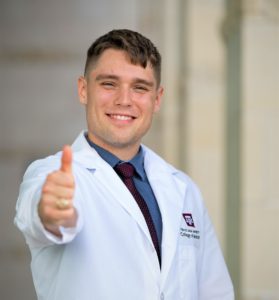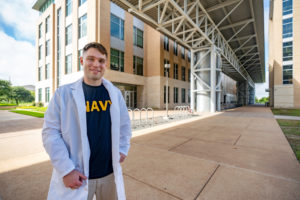From entomology to medicine
Medical student Andrew Chapman ’20, reflects on his experience in the Forensic and Investigative Sciences program
Texas A&M College of Agriculture and Life Sciences graduate Andrew Chapman knew he wanted to enter the medical field at an early age.

Growing up around his father’s veterinary clinic exposed him to the day-to-day inner workings of diagnosis and treatment. Although it was animal care, the experiences put him on the path to medical school.
As Chapman got older, he developed a compelling drive for selfless service and became interested in joining the military as a way to give back to the country. His interests in aviation, medicine and the military pointed him toward becoming a flight surgeon, a medical officer position that provides clinical medical care for service members in the aviation field from flight crews and pilots to astronauts and air traffic controllers.
Once enrolled at Texas A&M University, he chose a path few students travel to become a physician.
When Chapman reached Bryan-College Station, he joined the Corps of Cadets and began looking for an undergraduate program that would pique his interests and lay a solid foundation for him in medical school and as a physician. He saw an opportunity to stand out from other medical school applicants by entering the Forensic and Investigative Sciences program, FIVS, in the Texas A&M College of Agriculture and Life Sciences Department of Entomology.
“The program really aligned perfectly for me,” he said. “The university is my parents’ alma mater, the Corps of Cadets provided me character-building opportunities, and the forensic program provided a path that differentiates me from the majority of pre-med students. The challenging coursework, the faculty and the internship all helped me put together an undergraduate record that helped make me unique.”
Finding a path in the forensics program
Time as an undergraduate is what you make it, Chapman said. But the forensic program forced him into experiences that were invaluable to his progress and represent a path less traveled among pre-medical students.
“I think a lot of students don’t realize the forensic sciences program is a pre-med major,” he said. “A lot of people associate it with CSI, but they don’t think about it being the hard science that it is. But there are hundreds and hundreds of biomedical science and biology majors who apply to medical school each year, but there are only a few forensic science majors, and that really makes you stand out.”
The course load was challenging, and Chapman said professor and program director Aaron Tarone, Ph.D., and professor Jeff Tomberlin, Ph.D., were integral in his development, but it was the requirement that students participate in research or an internship that added an important dimension to learning.
If there is any tip Chapman would pass along to an undergraduate with a clear or not-so-clear idea of what their career niche might be – find an internship that applies to your field and is interesting.
Chapman landed an internship at the Bexar County medical examiner’s office, where he assisted pathologists with autopsies and learned from them about investigative aspects of cause-of-death inquiry.
It is the investigative aspect of forensic medicine that Chapman believes will help him as a physician. He may not become a pathologist, but he said the internship improved his deductive reasoning skills, which will be important as a physician.
“If you’re going to be a physician of any kind, you have investigative work to do, because it’s your job to find the diagnosis, and that takes deductive reasoning,” he said. “Patients are going to come in wanting to know what is going on with their bodies, and as a physician, it is up to you to investigate and figure out what is going on.”
Perspective for prospective FIVS students
Pete Teel, Ph.D., former associate head of the Department of Entomology and professor emeritus, said Chapman’s experiences in the FIVS program were similar to other students he’s seen over the past three decades.
Teel, who was among faculty who helped establish the forensic and investigative sciences program at Texas A&M, said the program – and its required research or internship assignment for students – introduces concepts that can be foundational in a wide range of fields and can help students find a career path.
“The program runs a gamut of applicable sciences when it comes to forensic investigation,” he said. “So, it is a challenging opportunity for any student who has natural curiosity and desire to solve mysteries. And the internship or research experience can reinforce the student’s idealized path or let them know they don’t want to go that direction. It’s immensely valuable either way.”
Teel said Chapman is correct that the forensic and investigative sciences major makes him stand out among those vying for a competitive career path.
“It not only makes you stand out, but the other part of that is for the individual once they get to the interview level, they are typically asked why that was the direction they chose, and they get to explain their career interests and how that became the path they chose.”
There are many potential career paths, from pathology, law enforcement and cybersecurity to practicing law or medicine, said Tarone. Program graduates also enjoy a high rate of success, whether entering the workforce or graduate school.
FIVS graduates who entered the job market were 98% employed with 62% employed in their field and 36% employed outside the field, according to survey responses from graduates. All graduates who pursued graduate studies continued their education, with 69% studying in the field and 31% studying outside the field.
Tarone attributes graduates’ ability to land jobs and enter graduate programs with a high rate of success to an underlying tenet of the program – problem-solving. A survey of employers by the Forensic Science Education Programs Accreditation Commission during a recent reaccreditation process revealed that one employer went out of its way to hire FIVS majors because the students sought solutions to problems before going to their supervisor.
“It just highlighted what we were trying to do, which is to create independent problem-solving individuals,” he said. “Employers see value in our students because of that, and I think their overall success stems in part from what they learn in this program.”
Chapman’s journey continues with med-school, military

The FIVS coursework includes many pre-medical school necessities like chemistry and biology. This knowledge, coupled with Chapman’s initiative as a student and effective leadership skills he displayed as the Aggie Forensic and Investigative Organization president, should serve him well as a medical student and ultimately as a physician, Tarone said.
“Whether a forensic science context or a medical context, it’s very similar. The outcome relates to your ability to make decisions based on the scientific information in front of you, and the consequences can be huge,” he said. “So, the importance of getting it right is the same no matter what forensic or investigative field a student enters.”
Chapman recently completed a med-camp designed to acclimate him to the pace and rigors of entering the Texas A&M College of Medicine. He’s committed to the Navy and will split time between school and service.
Texas A&M’s longstanding relationship with the military branches accommodates student’s service commitments while keeping them on track to graduate.
“I’m lucky that the College of Medicine is so military-oriented and works within my naval commitments, rotations at hospitals and clinics, wherever they send me,” he said. “That military relationship separates Texas A&M from any other medical school in Texas.”
Whether he is in medical school, on an aircraft carrier, or in a clinic as part of his Naval rotations, Chapman said he is looking forward to the next four years and residency or active duty beyond that. The path may be altered by new interests or goals, but Chapman feels like his academic and professional path ahead of him is on firm ground because of his experience in the Forensic and Investigative Sciences program at the College of Agriculture and Life Sciences.
“The College definitely helped prepare me for medical school and the Corps of Cadets prepared me for a life in the military. Anyone entering the forensic and investigative sciences program really just needs to find their niche,” he said. “Just take the initiative and find what fits you personally.”


